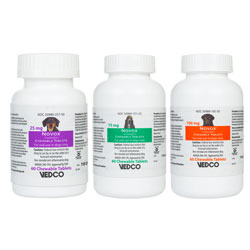Carprofen (generic) Chewable Tablets
+ Save on each recurring order!
Low Price Match Guarantee
Free Shipping on orders over $75
- For oral use in dogs only
- Carprofen
- Non-steroidal anti-inflammatory drug
- Generic Rimadyl
- Same ingredient as: Norocarp, Vetprofen, Carpaquin and Putney's Carprofen Caplets
- Available in 25mg, 75mg and 100mg
- Brands may vary
Description
Carprofen (generic) Chewable Tablets is a nonsteroidal anti-inflammatory drug (NSAID) that works by reducing hormones that cause pain and inflammation in the body, along with reducing pain from surgery or dental procedures and for the treatment of inflammation and stiffness as a result of conditions such as arthritis or hip dysplasia. Novox is a generic equivalent for Rimadyl (carprofen) caplets.
Carprofen (generic) Chewable Tablets Tablets for Dogs (compares to Rimadyl) are used for the relief of pain and inflammation associated with osteoarthritis and for the control of postoperative pain associated with soft tissue and orthopedic surgeries in dogs. The recommended dosage of Carprofen (generic) Chewable Tablets is 2 mg/lb. daily, given in 1 dose or divided between 2 doses daily.For
Dogs (over 6 weeks of age)Benefits
- Can be given as a single daily dose
- Effective
- Easy to administer
- Same ingredient as: Norocarp, Vetprofen, Carpaquin and Putney's Carprofen Caplets
- Relief from pain to improve quality of life
- Control of pain and inflammation from surgery
How it works
Carprofen (generic) Chewable Tablets is a non-steroidal anti-inflammatory drug (NSAID). It works by inhibiting the hormones which generate chemicals that are responsible for pain and inflammation.Dosage and Administration
What happens if I overdose the pet?
Seek emergency veterinary medical treatment. Symptoms of Carprofen overdose include nausea, vomiting, stomach pain, drowsiness, headache, blurred vision, seizures, panting, little or no urine production, and slow breathing.What is the most important information I should know about Carprofen?
Carprofen is a prescription medication that is FDA approved for use in dogs. Carprofen is available as 25mg, 75mg and 100mg capsule shaped scored non-chewable tablets (Caplets). The usual total daily dose in dogs is 2mg per pound given as a single daily dose or divided and administered as 1mg per pound twice a day. Contact the veterinarian if the pet has bloody, black or tarry stools as these symptoms could indicate damage to the stomach or intestines, which could be dangerous. Before giving your pet any prescription or over the counter medications check with your veterinarian or pharmacist.What should I discuss with my veterinarian before giving Carprofen to my pet?
Tell your veterinarian if your pet has an allergy to aspirin or any other NSAID; an ulcer or bleeding in the stomach; has liver, or kidney disease; congestive heart failure; fluid retention; bleeding disorders; heart disease or high blood pressure. Tell your veterinarian if your pet is pregnant or lactating.What should I avoid while giving Carprofen to my pet?
Many over the counter cough, cold, allergy and pain medicines contain aspirin or other NSAID's similar to Carprofen. Before taking any prescription or over the counter medications talk to the veterinarian or pharmacist.Possible side effects of Novox
Cautions
Information for Dog Owners
Carprofen, like other drugs of its class, is not free from adverse reactions. Owners should be advised of the potential for adverse reactions and be informed of the clinical signs associated with drug intolerance. Adverse reactions may include decreased appetite, vomiting, diarrhea, dark or tarry stools, increased water consumption, increased urination, pale gums due to anemia, yellowing of gums, skin or white of the eye due to jaundice, lethargy, incoordination, seizure, or behavioral changes. Serious adverse reactions associated with this drug class can occur without warning and in rare situations result in death (see Adverse Reactions). Owners should be advised to discontinue Carprofen therapy and contact their veterinarian immediately if signs of intolerance are observed. The vast majority of patients with drug related adverse reactions have recovered when the signs are recognized, the drug is withdrawn, and veterinary care, if appropriate, is initiated. Owners should be advised of the importance of periodic follow up for all dogs during administration of any NSAID.
Animal Safety
Laboratory studies in unanesthetized dogs and clinical field studies have demonstrated that carprofen is well tolerated in dogs after oral administration. In target animal safety studies, carprofen was administered orally to health Beagle dogs at 1, 3, and 5 mg/lb twice daily (1, 3, and 5 times the recommended total daily dose) for 42 consecutive days with no significant adverse reactions.
Serum albumin for a single female dog receiving 5 mg/lb twice daily decreased to 2.1 g/dL after 2 weeks of treatment, returned to the pre-treatment value (2.6 g/dL) after 4 weeks of treatment, and was 2.3 g/dL at the final 6-week evaluation.
Over the 6-week treatment period, black or bloody stools were observed in 1 dog (1 incident) treated with 1 mg/lb twice daily and 1 dog (2 incidents) treated with 3 mg/lb twice daily. Redness of the colonic mucosa was observed in 1 male that received 3 mg/lb twice daily.
Two of 8 dogs receiving 10 mg/lb orally twice daily (10 times the recommended total daily dose) for 14 days exhibited hypoalbuminemia. The mean albumin level in the dogs receiving this dose was lower (2.38 g/dL) than each of two placebo control groups (2.88 and 2.93 g/dL), respectively). Three incidents of black or bloody stool were observed in 1 dog. Five of 8 dogs exhibited reddened areas of duodenal mucosa on gross pathologic examination. Histologic exam of these areas revealed no evidence of ulceration, but did show minimal congestion of the lamina propria in 2 of the 5 dogs.
In separate safety studies lasting 13 and 52 weeks, respectively, dogs were administered orally up to 11.4 mg/lb/day (5.7 times the recommended total daily dose of 2 mg/lb) of carprofen. In both studies, the drug was well tolerated clinically by all of the animals. No gross or histologic changes were seen in any of the treated animals. In both studies, dogs receiving the highest doses had average increases in serum L-alanine aminotransferase (ALT) of approximately 20 IU.
In the 52-week study, minor dermatologic changes occurred in dogs in each of the treatment groups but not in the control dogs. The changes were described as slight redness or rash and were diagnosed as non-specific dermatitis, The possibility exists that these mild lesions were treatment related, but no dose relationship was observed.
Clinical field studies were conducted with 549 dogs of different breeds at the recommended oral doses for 14 days (297 dogs were included in a study evaluating 1 mg/lb twice daily and 252 dogs were included in a separate study evaluating 2 mg/lb once daily). In both studies the drug was clinically well tolerated and the incidence of clinical adverse reactions for carprofen-treated animals was no higher than placebo-treated animals (placebo contained inactive ingredients found in carprofen caplets). For animals receiving 1 mg/lb twice daily, the mean post-treatment serum ALT values were 11 IU greater and 9 IU less than pre0treatment values for dogs receiving carprofen and placebo, respectively. Differences were not statistically significant. For animal receiving 2 mg/lb once daily, the mean post-treatment serum ALT values were 4.5 IU greater and 0.9 IU less than pre-treatment values for dogs receiving carprofen and placebo, respectively. In the latter study, 3 carprofen-treated dogs developed a 3-fold or greater increase in (ALT) and/or (AST) during the course of therapy. Once placebo-treated dog has a greater than 2-fold increase in ALT. Non of these animals showed clinical signs associated with laboratory value changes. Changes in the clinical laboratory values (hematology and clinical chemistry( were not considered clinically significant. The 1 mg/lb twice daily course of therapy was repeated as needed at 2-week intervals in 244 dogs, some for as long as 5 years.
Clinical field studies were conducted in 297 dogs of different breeds undergoing orthopedic or soft tissue surgery. Dogs were administered 2 mg/lb of carprofen two hours prior to surgery then once daily, as needed for 2 days (soft tissue surgery) or 3 days orthopedic surgery). Carprofen was well tolerated when used in conjunction with a variety of anesthetic-related drugs. The type and severity of abnormal health observation in carprofen and placebo treated animals were approximately equal and few in number see Adverse Reactions). The most frequent abnormal health observation was vomiting and was observed at approximately the same frequency in carprofen and placebo treated animals. Changes in clinicopathologic indices of hematopoietic, renal, hepatic, and clotting function were not clinically significant.
The mean post treatment serum ALT values were 7.3 IU and 2.5 IU less than pre-treatment values for dogs receiving carprofen and placebo respectively. The mean post treatment AST values were 3.1 IU less for dogs receiving carprofen and 0.2 IU greater for dogs receiving placebo.







